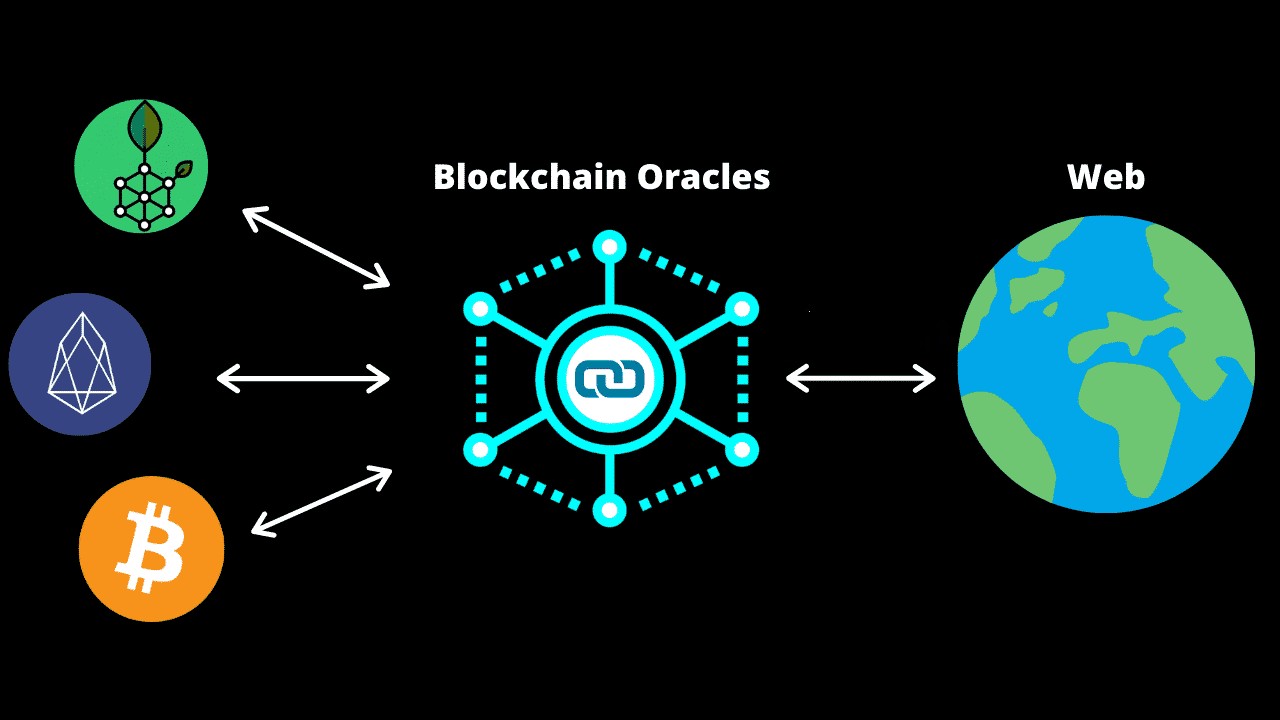In computer science, “oracle” refers to a program or system that can answer questions in a specific domain. For example, in software testing, an “oracle” may be a reference implementation or a set of expected outputs that can verify the correctness of a program.
Oracles in Blockchain Technology
In blockchain technology, an oracle is a third-party application or service that provides off-chain data to a smart contract on a blockchain. Smart contracts are self-executing code that runs on a blockchain. These contracts operate in a trustless environment without mediators.

But smart contracts are limited to the data available on the blockchain. It cannot access external data from other off-chain data sources, such as real-world events or data from other systems.
Enter Oracles. Oracles provide a way for smart contracts to interact with external data sources by being a bridge between the blockchain and the world. For example, an oracle can obtain the current price of a stock, the temperature in a certain location, or the outcome of a sports game.
However, the use of oracles introduces new security and reliability challenges. Oracles are vulnerable to attacks like data manipulation or denial-of-service attacks. These attacks can compromise the integrity of the data they provide to smart contracts. Therefore, it is crucial to design and test oracles to ensure security and reliability carefully.

Overall, oracles play a crucial role in expanding the capabilities of smart contracts and enabling the integration of blockchain technology with the world.
The Need and Function of Oracles in Blockchain Technology
Oracles in blockchain technology are vital, as they link the blockchain to the external world.
- The primary function of oracles is to provide off-chain data to smart contracts on the blockchain.
- Oracles enable smart contracts to interact with real-world events, such as the price of a stock, the weather conditions, or the outcome of a sports game.
- Accessibility to external data is essential for smart contracts, as it allows them to perform many functions and automate more complex processes.
The need for oracles arises from the fact that the
- Data stored on the blockchain is immutable, but limited to only the data available on the network itself. This means that
- Smart contracts cannot access off-chain data sources without an oracle.
- Oracles provide a secure and reliable way to obtain and verify external data, which is essential for the integrity of the smart contract’s execution.
In addition to providing data to smart contracts, oracles serve other functions, like triggering events based on external data, executing conditional contracts, and providing a way for smart contracts to interact with other systems.
However, using oracles introduces new security risks to the blockchain ecosystem.
Oracles can be vulnerable to data manipulation or denial-of-service attacks, compromising the integrity of the data they provide to smart contracts.
Therefore, it is necessary to carefully design and test oracles to ensure they are secure and reliable.
Advantages of Oracles in Blockchain Technology
Oracles provide several advantages in blockchain technology:
Access to external data: Oracles enable automated contracts to access external data. Accessing external data is essential for many blockchain functionalities. Automating complex processes and the execution of smart contracts are possible only because the contracts have access to external data.
Automation of processes: Oracles can automate the execution of processes that require external data, such as triggering a payment based on a particular event, without requiring intermediaries.
Flexibility: Oracle permits blockchain technology integration with other systems and technologies, such as IoT devices. The integration, in turn, expands the scope and potential uses of blockchain technology.
Security: Oracles provide a secure and reliable way to obtain and verify external data, which is essential for the integrity of the smart contract’s execution.
Decentralization: Oracles can be decentralized, which aligns with the principles of blockchain technology and eliminates the need for a central authority to provide external data.

Overall, oracles play a crucial role in expanding the capabilities of blockchain technology and enabling its integration with the world. Oracles extend blockchain technology’s application to a broader range of uses and industries by providing access to external data, automating processes, and improving security.
Summary
An Oracle is a software or a third-party service that provides information by predictions based on actions that have occurred in the past or recently. Oracles help make predictions with the help of data models and these aid humans to take informed decisions.
However, oracles in blockchain technology are used to provide off-chain data to smart contracts. By doing so, smart contracts can function better and automate their execution with ease.
Although Oracles extend their functions to create a better-decentralized way of functioning since it provides information from an external source, the decentral network has no power over the legitimacy of the data received.
Consequently, Oracles can be decentralized and web3 can be secure from misinformation. Once the security is taken off, the advantages such as external data access, flexibility, and process automation make working in web3 and deploying smart contracts a piece of cake!

